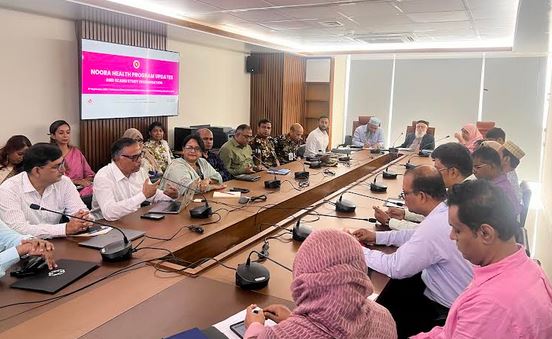News Flash
News Flash

DHAKA, Sept 9, 2025 (BSS) - A recent study revealed that targeted health education programmes focusing on the family companions at hospitals can significantly improve key maternal and newborn health practices in Bangladesh.
Noora Health Bangladesh under the direction of the Directorate General of Health Services (DGHS) conducted the study on the effectiveness of the Care Companion Program (CCP) in Special Care Neonatal Units (SCANUs) across 13 health facilities in the country, said a press release.
Research Associate of Monitoring and Evaluation at Noora Health Jakia Yasmin presented the findings at a dissemination programme at the DGHS conference room in the city's Mohakhali area today. DGHS Director General (DG) Professor Dr Md Abu Jafor spoke at the event as the chief guest.
The event focused on presenting the effectiveness of Noora Health's CCP sessions delivered across Special Care Neonatal Units (SCANUs).
According to the release, the study employed a quasi-experimental design to compare standard care with CCP, which provides structured caregiver education on newborn and postnatal care prior to hospital discharge.
Surveys were carried out at the hospital and during 30-day and 60-day follow-ups with mothers whose babies had been admitted to SCANUs. The evaluation found that CCP enhanced maternal knowledge and adoption of essential health practices, resulting in improved care behaviors at home and reduced hospital readmissions for both mothers and newborns.
The study revealed a remarkable increase in maternal knowledge and adoption of essential health practices.
According to findings, mothers who participated in the programme were more than twice as likely to be aware of exclusive breastfeeding (EBF), and their practice of EBF was 26 percent higher.
The programme also led to significant gains in other critical areas: Awareness of Kangaroo Mother Care (KMC) jumped to 59 percent in the intervention group, compared with just 23 percent in the control group.
The practice of KMC more than doubled, with 28 percent of mothers in the CCP group using this technique, compared to 13 percent in the control group.
Mothers who received health education were also 77 percent more likely to practice burping and showed notable improvements in umbilical cord care.
However, the study also revealed that improvements in areas such as hand hygiene and recognition of newborn danger signs were limited, underscoring the need for further strengthening of caregiver training in these aspects.
Speaking on the occasion, Professor Dr Md Abu Jafor said, "Our national goal is to achieve Universal Health Coverage by 2030. To reach this target, we must strengthen our health service system".
The system should be well-integrated and comprehensive, which requires strong public-private partnerships, digitalization, and active community involvement, he said, adding, hrough the Care Companion Programme, Noora Health is addressing all these key components.
"This achievement is truly commendable, and I extend my heartfelt congratulations to them," Dr Jafar said.
DGHS Additional Director General (planning and development) Professor Dr Sheikh Sayidul Haque, Co-country Director of Noora Health Bangladesh Dr Arefin Amal Islam and Noora Health's Co-CEO Dr Shahed Alam also spoke at the function.
DGHS Director (planning and research) Dr Afreena Mahmood delivered the concluding remarks while Assistant Director (planning and research) Dr Umme Ruman Siddiqi moderated it.